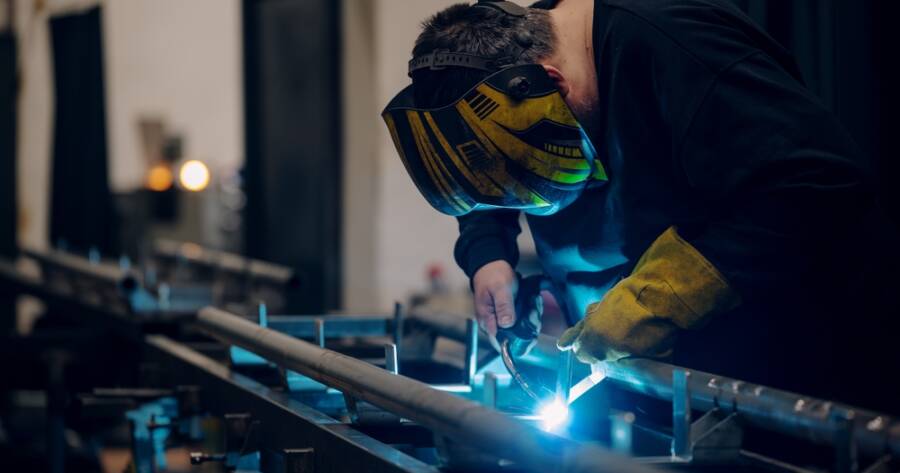The welding industry offers a wide range of career opportunities with excellent potential for growth. With hands-on training and the chance to work on exciting projects, welding is a dynamic field that offers both stability and variety. Whether you’re new to the industry or looking for a change, now is the perfect time to begin your journey in welding.
The Basics of Welding
Welding is the process of joining two or more materials, typically metals, by using heat, pressure, or a combination of both to form a strong bond. There are several types of welding processes, each suited for different materials and purposes. The most common welding methods include:
- MIG (Metal Inert Gas) Welding: This is one of the most popular welding techniques due to its versatility and ease of use. MIG welding is typically used in automotive, manufacturing, and repair industries.
- TIG (Tungsten Inert Gas) Welding: Known for its precision and ability to weld thin materials, TIG welding is widely used in industries like aerospace, food and beverage, and high-end manufacturing.
- Stick Welding (SMAW – Shielded Metal Arc Welding): This is a highly durable and versatile process, often used in construction and heavy industries where strength and reliability are paramount.
- Flux-Cored Arc Welding (FCAW): Similar to MIG welding, but with a flux core, FCAW is often used for outdoor and heavy-duty applications, making it ideal for construction and shipbuilding.
Each of these methods requires specific skills and knowledge, but all share a common foundation of training and expertise that can lead to a fulfilling career.
Career Opportunities in Welding
The demand for skilled welders is high, as nearly every industry relies on welding in some capacity. Some of the key industries that employ welders include:
- Construction: Welders in construction work on everything from steel beams to pipelines and building structures. These jobs often involve large-scale, outdoor projects and can range from commercial buildings to residential homes.
- Manufacturing: Welders in manufacturing are responsible for fabricating metal parts, machinery, and equipment. This field often offers opportunities for welders to work with advanced technology, robotics, and automated systems.
- Aerospace: In the aerospace industry, welders create and repair the parts used in aircraft, satellites, and other space-related equipment. This sector requires a high level of precision and skill, and offers competitive pay and benefits.
- Automotive: Welders in the automotive industry work on assembling vehicles, repairing body parts, or creating custom parts. With the rise of electric vehicles and automotive innovations, welding jobs in this field continue to evolve and expand.
- Shipbuilding and offshore: Welders in the maritime industry work on building and repairing ships, oil rigs, and other offshore structures. These jobs often involve working in remote locations and can offer high wages and travel opportunities.
- Pipeline welding: Welders in the pipeline industry are responsible for constructing and maintaining the vast network of oil and gas pipelines that stretch across the country and beyond. This is a high-demand field with a need for specialized skills.
Skills and Training Required
Welding offers numerous career paths, but it’s essential to undergo proper training to be successful. Many welding programs are offered at vocational schools, community colleges, and trade schools. These programs typically last between six months and two years and include both classroom instruction and hands-on practice.
After completing a welding program, most welders pursue certification from a recognized organization. Certification ensures that welders meet industry standards and enhances their job prospects. Continuing education and gaining experience with different welding techniques can also improve career advancement opportunities.
Job Outlook and Salary
The welding industry offers a strong job outlook, with demand for skilled welders expected to grow. As the demand for infrastructure development, manufacturing, and renewable energy projects increases, so will the need for skilled welders.
The salary for welders can vary depending on experience, industry, and location. On average, welders earn a median annual wage of $42,904, according to the BLS. However, welders in specialized fields, such as aerospace or pipeline welding, can earn significantly higher wages, with experienced welders earning up to $60,000 or more per year.
Welding Careers: Unlock Opportunities for Growth, Stability, and Success
Welding offers a rewarding and stable career with a wide range of opportunities across numerous industries. Whether you’re interested in working in construction, manufacturing, aerospace, or pipeline welding, there are numerous career paths to explore.
With the right training and certification, you can unlock a future filled with opportunity, job security, and personal fulfillment. If you’re ready to start your journey in this hands-on and dynamic field, now is the perfect time to begin your career in welding!





